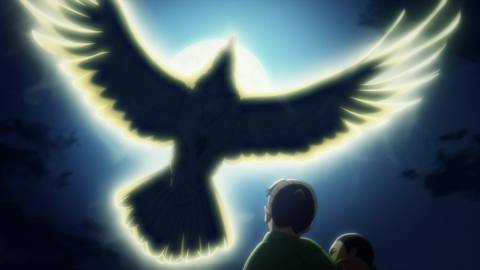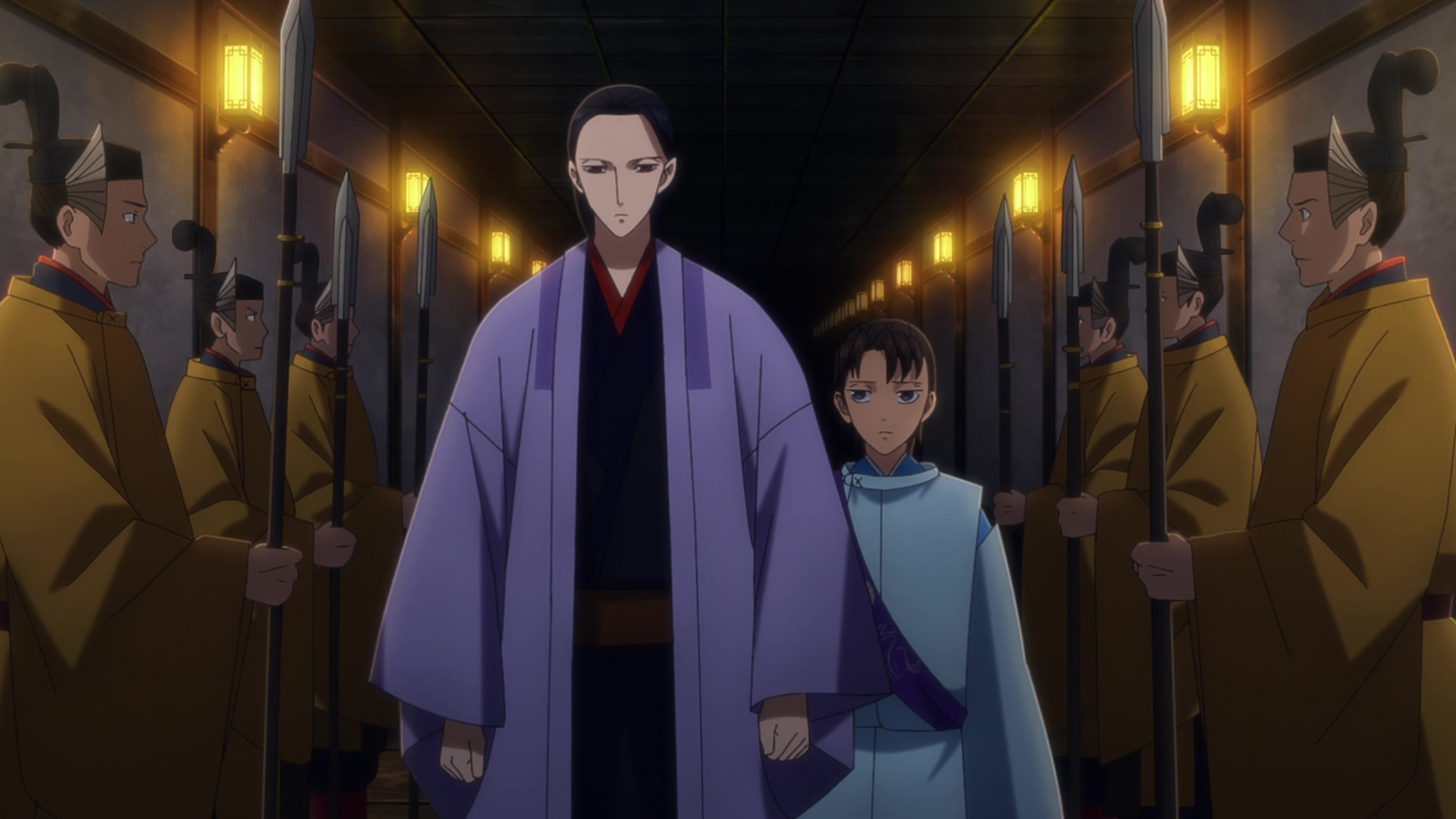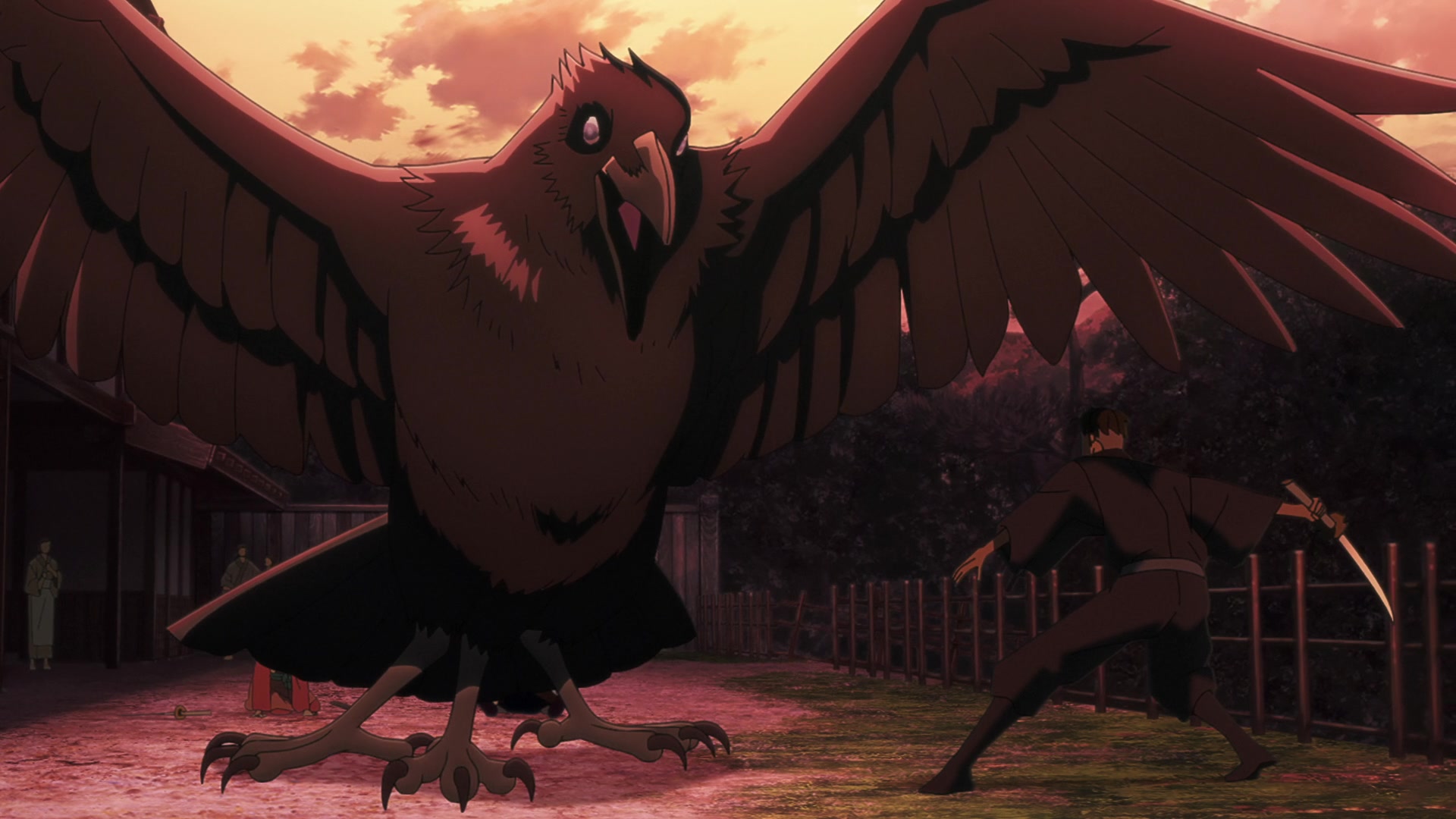
The franticness of anime seasons can always end up leaving some shows flying under the radar in terms of their discussion, either overshadowed by the shonen of the month or maybe just passed over because people tuned out for a bit (in this case, the Olympic broadcasts disrupted things a little). And so here I am, hat in hand, as an incredibly high-profile fall season begins to accelerate, to say: You should really consider catching up on the bird politics anime from April.
Well, bird politics and mystery, historical fantasy, among other things. We’re talking about Yatagarasu: The Raven Does Not Choose Its Master, directed by Yoshiaki Kyōgoku (Laid Back Camp) with animation production from studio Pierrot (famous for Naruto and Yu Yu Hakusho).
It’s one of the most captivating and unique anime series of the past few months, constantly elaborating on its curious historical fantasy world, building it out with compelling sociological detail and the rippling effects of its main, magical conceit. This dovetails perfectly with a deliberately paced court drama, one full of visual opulence and backstabbing, while also feeling surprisingly down to earth — even though all of its characters can transform into giant, three-legged ravens, the mythical yatagarasu of the title. (If you’re like me — British — the idea of people transforming into ravens is very strongly associated with something else.)
As its characters readily turn their bodies and robes into wings, the show feels just as capable of shape-shifting with natural ease — action, decompressed conversation, mystery, and courtroom intrigue all feel at home together here in the fictional Yamauchi, a land that resembles a feudal past with its kingdom divided into smaller fiefdoms ruled by noble houses. The second half of the season feels even more transformative; it hints at a larger mystery around the nature of Yamauchi itself, the nature of which vastly expands its thematic reach in ways I won’t spoil here. Both parts of the series drop these thrilling revelations with a methodical, consistent pace. But the first half is more focused with its turmoil: As in the novels by Chisato Abe that the show is based on, Yatagarasu features houses ruled over over by a single monarch, and the series begins as that power is about to change hands.

Crown prince Nazukihiko is about to become ruler, having supposedly inherited that divine power of the “k’inu”: the Golden Raven, believed to have powers beyond the other big birds. Yatagarasu starts with a number of secret battles being fought on multiple fronts: One is over the line of succession, and the other is a competition for the would-be monarch’s hand in marriage.
The latter is seemingly lower-stakes but also incredibly revealing of the attitudes of the nobles and the show’s outlook on them. The former is seen through the eyes of Yukiya, the middle child of a wealthy family from the countryside, who moves to the central palace to become the prince’s servant. The role quickly embroils him in a complex web of espionage and secret alliances. He’s more built for this world than he’d care to admit to anyone, far more cunning and capable than he lets on. (Also great: the unlikely and prickly friendship between him and his new employer, the prince.) Like how the prince keeps his own sharpness hidden, Yukiya acts like a klutz, while secretly bitter about the system he works in, one which tore him away from his birth mother and left him the subject of village gossip — and that distaste for it makes him a perfect agent of change for the prince, loyal to people rather than the promise of political power.
The show also follows Asebi, a lady who moves to an auxiliary palace as she waits to see if she or any of a number of other women of noble standing will become the prince’s consort. It’s fast apparent that everyone is there with an ulterior motive, and the competition for the prince’s hand becomes surprisingly intense, even more than the baseline misogyny of the women being treated like prizes to be won. That story comes to a captivating, shocking conclusion in an episode that illustrates how exciting it is to simply see these characters talk through the truth about themselves.
The thrill of the show is seeing how these disparate worlds — of fantasy, of the would-be consorts, of hereditary lordship and warriors, and, let’s not forget, giant birds — overlap in secret struggles for power, and how that poisonous ambition trickles down to everyone else, jostling for anything that places them closer to power. That’s characterized by some rather thrilling dialogue, each conversation a sort of battle in its own way. Sometimes it’s not even because of the intrigue; there’s some charming friction between Yukiya and his boss, whose elusiveness and air of mystery sometimes give way to him just being a pretty weird guy to work for, the show leveraging their odd-couple relationship for a lot of its levity. Yatagarasu is decompressed and talky, but it’s not all ponderous court drama. While it doesn’t overindulge, the quick bursts of violence can be intense, and a murder mystery arc in its second half gets shockingly brutal at points; even before then, some of the ploys by the royals directly lead to bloodshed.

The intricate web of Yatagarasu’s cruel, ugly political battlefield is often presented through some striking framing, even if the animation isn’t always the flashiest. Rather than action, it’s clear that the priorities lie in character work — detailed facial expressions highlighting the importance of its conversations, the carefully layered fabrics of the costume design matching the character’s seemingly delicate demeanor, but all with the consciousness of the facade that this wealthy affluence provides.
The show’s attention to the details of social construction pays off as it then shows how everything is poisoned by these power struggles. There’s the distinction between “hill ravens” from the country and “court ravens” from the city at the center, this centralization of wealth made clearer by the show’s trips outside of the city to slums built up the sides of ravines. Yukiya’s brothers are even robbed by wealthy visitors at the beginning (they only get payback because they themselves have the protections afforded by being the sons of a local lord). One of the show’s most horrific concepts is the “horses” — other yatagarasu who can’t shift back to human shape, not through lack of ability, but just because they’re too poor to live by human means.
It’s funny to think that the most exciting moments of a series about people that can transform into a species of bird mostly focuses on the human aspect; the transformation seems almost secondary to everything else. Not that the raven forms don’t carry any weight: That the characters all look the same when they turn into birds, though perhaps unintentional, feels like an illustration of how arbitrary these social divisions are, how petty the squabbles of the palaces seem.
There are certainly flashier shows, both airing simultaneously and in this new season, but none that have quite compelled me to throw on the next episode as this. The show’s fantastical hook is only half the appeal, the rest lying in its fascinating scaling of the social ladder, and the thoughtfulness of how its character work ties in with the depth of its world-building. Yatagarasu feels incredibly fresh, and though many have affectionately referred to it as the “bird show,” it’s more than just a novelty — the continual surprises of its confident storytelling make it one of the most exciting anime shows of an already very good year, a claim I can make without fear of eating crow.
